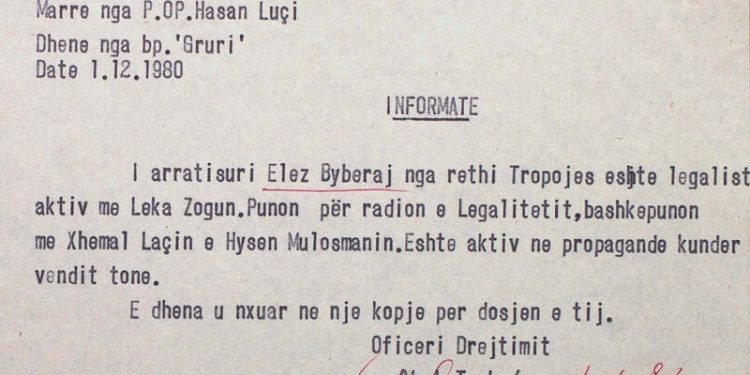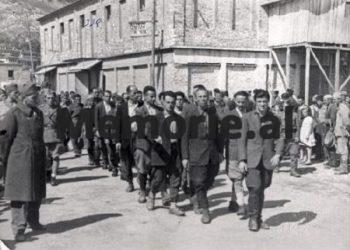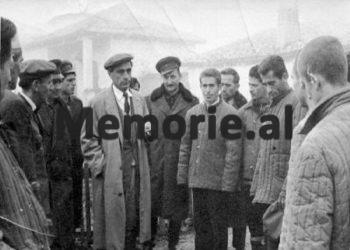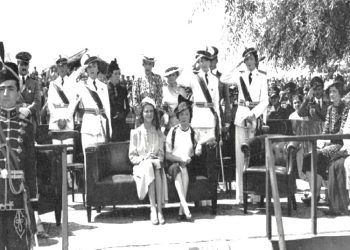
By Kastriot Dervishi
For prominent and quality persons as opponents of the communist regime, the political intelligence body opened processing files or verification files. A file, neither a file nor a processing file, is also the responsibility of Elez Biberaj. The time of information is in the years 1981-1990. Biberaj has been a member of the Albanian Studies Association since 1978. His family had fled Albania to Yugoslavia in 1951 and settled in the United States in 1968. In December 1980, he began working for VOA. The opening of a file against him began after he started working for “Voice of America”. The file construction technique is simple. It consists of reports of the residency of the Albanian mission to the UN and the processing that was done to them without quality by the Third Directorate of State Security in the Ministry of Interior. The file can be considered a failure as it has not achieved any objectives. Even information like this attached is extremely naive.
According to the records, Biberaj was determined to make known the Yugoslav oppression in Kosovo, as well as the rights of Albanians in Yugoslavia. Biberaj’s contribution to the Kosovo issue was in fact beyond years and institutions. A report dated 25.6.1982, compiled by operative Ylli Nushi and approved by the chairman of the 5th Branch of the Third State Security Directorate at the Ministry of Interior, Socrates Çomo, stated that “US political and military circles “they had” knitted and knitted “constantly plans and plots against our country”, for the realization of which they also used the Albanian political emigration.
On May 2, 1982, Biberaj delivered a lecture on “Albania and the Third World” at Columbia University in New York, a study that shed light on the ideological, political, economic, and cultural aspects of Albania. In New York, Albania’s diplomatic mission included Security Officer Todi Rizo (followed by Bashkim Spaho, Ilia Zhulati, etc.). He reconciled the data obtained mainly from open sources such as newspapers, magazines, radio, etc., as well as from persons who played a double game, putting him badly immersed in counter-information. In the analysis of the facts brought, the information as it was processed in Tirana. This connection between the two, with notes from the leaders of the Third Directorate, is the “persecution” that enriched Biberaj’s file with data.
On June 26, 1982, the first plan for Elez Biberaj was drafted. Emphasis was placed on the collection of biographical data. Security was constantly in difficulty to build a logical line of information. Despite this, it is clear that Biberaj was very interested in the issue of Kosovo and the Albanians in general.
The report dated 18.7.1984 stated that Biberaj was “in the service of spider discovery”. The “Spider” codified the United States. “He is a very smart and thoughtful guy. In thought it is liberal. You can sit down with him to talk, despite the different opinions he maintains, ”the info said. The Albanian diplomatic mission in New York constantly calls him to meet him, but Biberaj says that despite being Albanian, they “stayed away” and did not connect at any meeting point. He could not accept any meeting as long as Albania’s policy with the United States had not changed or “would never change” as Albanian diplomats there said.
A note dated 23.3.1985 states that “in the materials on Kosovo it goes against the Yugoslavs and in defense of the Kosovo issue”. In the following analyzes, the study “Albania and China 1962-1978” is analyzed.
In an analysis published on 18.4.1985 in the newspaper “The Sun”, Elez Biberaj said that with the death of Enver Hoxha “the terrible power of the secret police was reduced and the domestic policy of the strong hand of the past was diverted”. According to him, the changes were expected to be “slow and gradual”. In another analysis dated 9.2.1986, the article “Albania after Hoxha, the dilemma of change” was brought to attention, published in the American magazine “Problems of Communism”. The magazine described Biberaj as “an important researcher and editor-in-chief on Soviet and Eastern European affairs at USIA.” USIA was the US Intelligence Agency. In this article, Biberaj emphasizes the fact that Hoxha “created a highly centralized society”, enriching terror and force as instruments.
According to the note dated 7.7.1985, he was an “important person” and that his writings represented “the official attitude of the United States towards Albania.” The report dated 25.10.1989 stated that no conclusion had yet been reached on the object, which meant that the file did not contain the elements required for the regime. The last information in the file is dated 28.6.1990. The file was archived on 20.2.1992. Less than 600 pages of documents were created along with the file./Memorie.al














